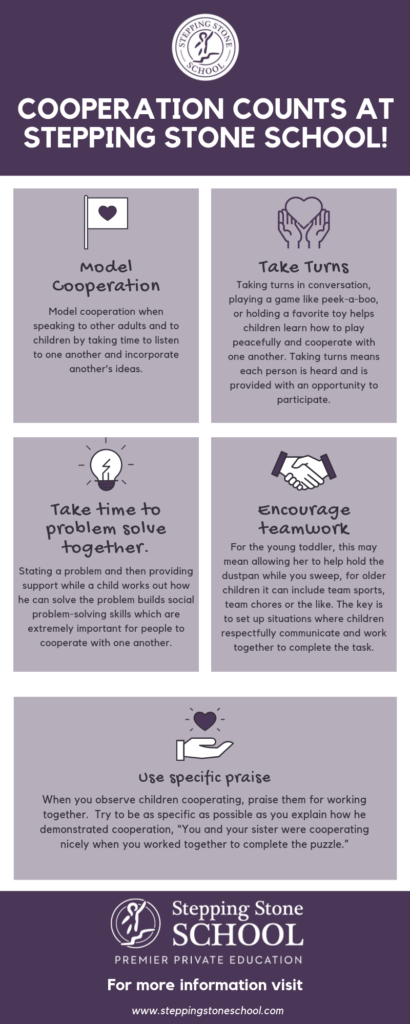Cooperation Counts!
In eager anticipation, children recently began a new school year. I heard child wonderings about new friends and old friends, new classrooms and new teachers, and what they will learn. At the beginning of the year, it is the goal of teachers to take the group of individuals assigned to their classroom and form a cohesive group of learners.
Through cooperation, children learn aspects which make this transition into a group of learners possible. By focusing on aspects of cooperation like sharing, taking turns, and working together, the teachers at Stepping Stone School are prepared to meet the new school year with new children as well.
Together, we can help children learn to cooperate with one another:
1. Model Cooperation. Model cooperation when speaking to other adults and to children by taking time to listen to one another and incorporate another’s ideas.
2. Take Turns. Taking turns in conversation, playing a game like peek-a-boo, or holding a favorite toy helps children learn how to play peacefully and cooperate with one another. Taking turns means each person is heard and is provided with an opportunity to participate.
3. Take time to problem-solve together. Stating a problem and then providing support while a child works out how he can solve the problem builds social problem-solving skills which are extremely important for people to cooperate with one another.
4. Encourage teamwork. For the young toddler, this may mean allowing her to help hold the dustpan while you sweep, for older children it can include team sports, team chores or the like. The key is to set up situations where children respectfully communicate and work together to complete the task.
5. Use specific praise. When you observe children cooperating, praise them for working together. Try to be as specific as possible as you explain how he demonstrated cooperation, “You and your sister were cooperating nicely when you worked together to complete the puzzle.”
Cooperation is one of those skills we are always learning. By participating in a task cooperatively from an early age, children will gain a better understanding of the meaning of value of cooperation.

Resources:
Brown, K. (2016, Feb. 22). “5 Tips for Teaching Cooperation.” Retrieved on August 1, 2016 from http://www.kidsintransitiontoschool.org/5-tips-for-teaching-cooperation/
Slover, D. (2011, March 5). “10 Ways to Teach Your Kids Cooperation.” Retrieved on August 1, 2016 from http://www.selfgrowth.com/articles/10-ways-to-teach-your-kids-cooperation
Zero to Three. (2010, Feb. 20).“Tips on Helping Your Child Learn to Cooperate.” Retrieved on August 1, 2016 fromhttp://www.zerotothree.org/child-development/social-emotional-development/tips-on-helping-your-child-cooperate.html